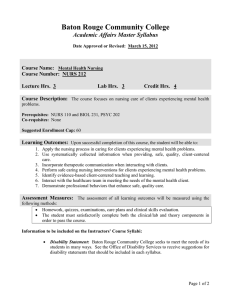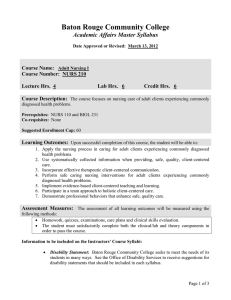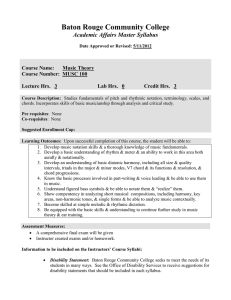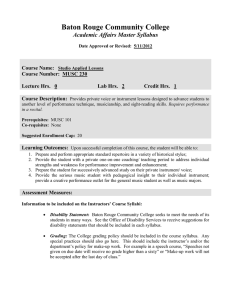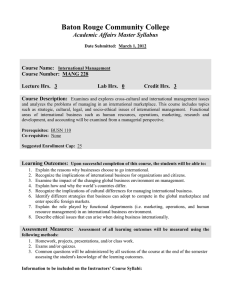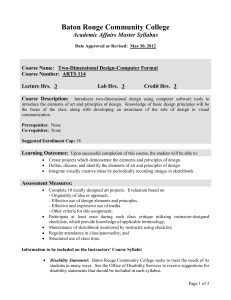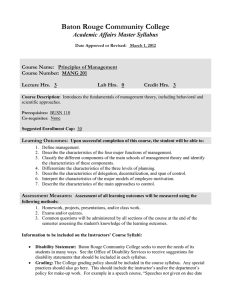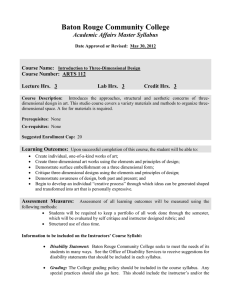Baton Rouge Community College Academic Affairs Master Syllabus
advertisement
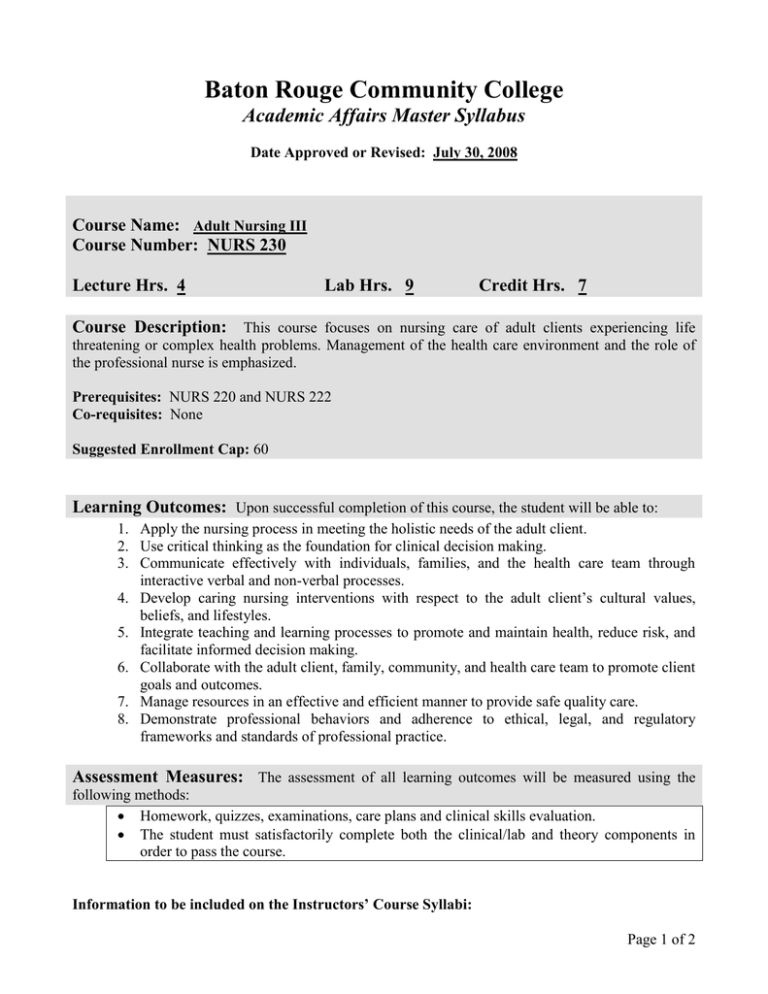
Baton Rouge Community College Academic Affairs Master Syllabus Date Approved or Revised: July 30, 2008 Course Name: Adult Nursing III Course Number: NURS 230 Lecture Hrs. 4 Lab Hrs. 9 Credit Hrs. 7 Course Description: This course focuses on nursing care of adult clients experiencing life threatening or complex health problems. Management of the health care environment and the role of the professional nurse is emphasized. Prerequisites: NURS 220 and NURS 222 Co-requisites: None Suggested Enrollment Cap: 60 Learning Outcomes: Upon successful completion of this course, the student will be able to: 1. Apply the nursing process in meeting the holistic needs of the adult client. 2. Use critical thinking as the foundation for clinical decision making. 3. Communicate effectively with individuals, families, and the health care team through interactive verbal and non-verbal processes. 4. Develop caring nursing interventions with respect to the adult client’s cultural values, beliefs, and lifestyles. 5. Integrate teaching and learning processes to promote and maintain health, reduce risk, and facilitate informed decision making. 6. Collaborate with the adult client, family, community, and health care team to promote client goals and outcomes. 7. Manage resources in an effective and efficient manner to provide safe quality care. 8. Demonstrate professional behaviors and adherence to ethical, legal, and regulatory frameworks and standards of professional practice. Assessment Measures: The assessment of all learning outcomes will be measured using the following methods: Homework, quizzes, examinations, care plans and clinical skills evaluation. The student must satisfactorily complete both the clinical/lab and theory components in order to pass the course. Information to be included on the Instructors’ Course Syllabi: Page 1 of 2 Disability Statement: Baton Rouge Community College seeks to meet the needs of its students in many ways. See the Office of Disability Services to receive suggestions for disability statements that should be included in each syllabus. Grading: The College grading policy should be included in the course syllabus. Any special practices should also go here. This should include the instructor’s and/or the department’s policy for make-up work. For example in a speech course, “Speeches not given on due date will receive no grade higher than a sixty” or “Make-up work will not be accepted after the last day of class.” Attendance Policy: Include the overall attendance policy of the college. Instructors may want to add additional information in individual syllabi to meet the needs of their courses. General Policies: Instructors’ policy on the use of things such as beepers and cell phones and/or hand held programmable calculators should be covered in this section. Cheating and Plagiarism: This must be included in all syllabi and should include the penalties for incidents in a given class. Students should have a clear idea of what constitutes cheating in a given course. Safety Concerns: In some programs this may be a major issue. For example, “No student will be allowed in the safety lab without safety glasses.” General statements such as, “Items that may be harmful to one’s self or others should not be brought to class.” Library/ Learning Resources: Since the development of the total person is part of our mission, assignments in the library and/or the Learning Resources Center should be included to assist students in enhancing skills and in using resources. Students should be encouraged to use the library for reading enjoyment as part of lifelong learning. Expanded Course Outline: I. Nursing Care of Adult Clients Experiencing Life Threatening and Emergent Situations II. Nursing Care of Adult Clients Experiencing Neurologic Disorders III. Management of Care of Multiple Clients in the Nursing Environment IV. Nursing in Disaster Situations V. Professional and Workforce Issues VI. Pharmacotherapeutics Related to Care of the Adult VII. NCLEX Prep Page 2 of 2
